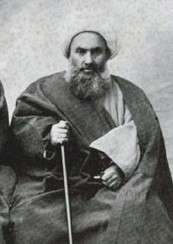
Back فضل الله النوري Arabic Şeyx Fəzlullah Nuri Azerbaijani Fadl Allah Nuri Catalan Fazlollah Nuri German Fezlullah Nuri Tebersi DIQ Sheij Fazlollah Nurí Spanish شیخ فضلالله نوری Persian Fazlollâh Nuri French ファズロッラー・ヌーリー Japanese شیخ فضلالله نوری MZN
Fazlollah Noori | |
|---|---|
شيخ فضلالله نوری | |
 | |
| Personal life | |
| Born | December 24, 1843 |
| Died | July 31, 1909 (aged 65) Tehran, Iran |
| Resting place | Fatima Masumeh Shrine |
| Nationality | Iranian |
| Parent | Abbas Mazandarani (father) |
| Religious life | |
| Religion | Islam |
| Jurisprudence | Twelver Shia Islam |
| Muslim leader | |
| Successor | Ruhollah Khomeini |
Sheikh Fazlollah bin Abbas Mazindarani (Persian: فضلالله بن عباس مازندرانی; 24 December 1843 – 31 July 1909), also known as Fazlollah Noori (Persian: فضلالله نوری), was a major figure in Iranian Constitutional Revolution (1905-1911) as a Twelver Shia Muslim scholar and politically connected mullah of the court of Iran's Shah. Originally a supporter of the constitution, he turned against it after the supporting constitution shah died and was replaced by one opposing the constitution. He was hanged as a traitor in 1909 by a court of the constitutionalist government for "sowing corruption and sedition on earth".[1]
In the Islamic Republic of Iran he is celebrated for defending Sharia law and Islam against agents of the West, and portrayed in school textbooks as a martyr (shahid) to Islam and the motherland.[2][3][4][5] Among historians outside of Iran he is known for having originally supported the constitutionalist revolution but having reversed himself when it was no longer politically expedient, for being "responsible for the murder of leading constitutionalists"[2] by inciting mobs and issuing fatwas declaring parliamentary leaders "apostates", "atheists," "secret masons" and koffar al-harbi (warlike pagans) whose blood ought to be shed by the faithful;[6][1] and (contrary to the mythology his opposing foreigners encroaching on Iran's culture, economy and society) for having taken money and given support to foreign interests in Iran.[7]
Nouri was a financially successful court official responsible for collected religious funds, for conducting marriages and contracts, including the wills of wealthy men.[8] Under the monarch Mozaffar al-Din Shah, who accepted demands for democratic reforms and agreed to surrender political powers to the parliament, he sided with the Iranian Constitutional Revolution. However, Noori turned against the revolution after Mozaffar al-Din's death and his successor (Muhammad Ali Shah Qajar) moved to close the parliament and return to the country to monarchical absolutism.[9] He joined the Shah in a vigorous propaganda campaign against modern parliamentary system, insisting that the role of the elected parliament (majles) was as a forum for consultation, whereas the laws should come only from Sharia.[10][11]
- ^ a b Abrahamian, Ervand, Tortured Confessions by Ervand Abrahamian, University of California Press, 1999 p. 24
- ^ a b Abrahamian, Khomeinism, 1993: p.96
- ^ Molavi, Afshin (2002). Persian Pilgrimages: Journeys Across Iran. W. W. Norton & Company. pp. 192-. ISBN 978-0-393-05119-3. Retrieved 1 June 2015.
The Tehran billboard of Nouri, erected shortly after the revolution by the Islamic Republic of Iran, presents a different story, one of martyrdom. ... The message is not subtle: the Unjustly hanged Sheikh Fazlollah Nouri, ... was martyred for his defense of Islam against democracy and representative government.
- ^ Moin, Baqir (1999). Khomeini: Life of the Ayatollah. I.B.Tauris. p. 19. ISBN 978-1-85043-128-2.
- ^ Cite error: The named reference
Basmenjiwas invoked but never defined (see the help page). - ^ Taheri, Amir, The Spirit of Allah by Amir Adler and Adler (1985), pp. 45–6
- ^ Abrahamian, Khomeinism, 1993: p.95-6
- ^ Farzaneh 2015, pp. 195.
- ^ Cite error: The named reference
:2was invoked but never defined (see the help page). - ^ Farzaneh 2015, p. 201.
- ^ Jahanbegloo, Ramin (2004). Iran: Between Tradition and Modernity. Lexington Books. p. 82. ISBN 978-0-7391-0530-6.